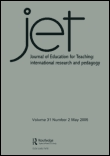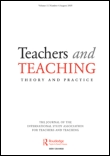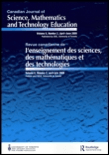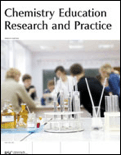
Avances de Investigacion en Educacion Matematica
Scope & Guideline
Fostering Collaboration for a Brighter Mathematical Future.
Introduction
Aims and Scopes
- Mathematical Connections:
The journal places a strong emphasis on the role of mathematical connections, including intra-mathematical and extra-mathematical connections, in enhancing the learning process. This involves studying how students relate different mathematical concepts and apply them in real-world contexts. - Teacher Education and Professional Development:
A core area of focus is on the training and professional development of mathematics teachers. This includes exploring pedagogical strategies, emotional aspects of teaching, and the integration of sustainability competencies in mathematics education. - Student Learning and Reasoning:
Research on students' mathematical reasoning and problem-solving strategies is prevalent. The journal investigates how different student demographics, including those with special needs, engage with mathematical concepts and tasks. - Sociocultural Perspectives:
The journal incorporates sociocultural frameworks into mathematics education research, examining how cultural and social contexts influence teaching practices and learning outcomes. - Innovative Assessment Practices:
There is a focus on developing and validating assessment tools that can effectively evaluate students' understanding and skills in mathematics, particularly in modeling and reasoning.
Trending and Emerging
- Sustainability in Mathematics Education:
There is a notable increase in research focusing on integrating sustainability into mathematics teacher education. This theme reflects a growing awareness of the importance of equipping future educators with the skills to address environmental and social issues through mathematics. - Emotional and Affective Dimensions of Teaching:
Emerging themes related to the emotional experiences of teachers and students in mathematics education are gaining traction. Understanding the affective dimensions of teaching is critical for fostering a positive learning environment. - Ethnomathematics and Cultural Connections:
Research exploring ethnomathematical connections and how cultural contexts influence mathematical understanding is increasingly prominent. This theme underscores the importance of culturally relevant pedagogy in mathematics education. - Innovative Assessment and Modeling Practices:
There is a rising focus on developing innovative assessment strategies and modeling practices that enhance students' mathematical reasoning and problem-solving abilities. This trend indicates a shift towards more practical and applied approaches in mathematics education. - Mathematics for Special Needs Education:
Research addressing the specific needs of students with disabilities in mathematics learning is becoming more prevalent. This emerging theme emphasizes inclusivity and the importance of differentiated instruction in mathematics education.
Declining or Waning
- Traditional Mathematical Content:
There seems to be a decline in publications strictly focused on traditional mathematical content without connections to broader educational contexts. The shift towards more integrative and applied approaches suggests a move away from purely theoretical discussions. - Generalized Statistical Education:
Research that deals with general statistical education without specific applications or connections to sustainability or other interdisciplinary themes is less frequently published, indicating a trend towards more specialized and context-rich statistical investigations. - Historical Perspectives in Mathematics Education:
Themes related to the historical development of mathematics education are appearing less often in recent publications. This may reflect a growing interest in contemporary issues and practical applications rather than historical analysis.
Similar Journals

International Journal for Technology in Mathematics Education
Empowering educators with cutting-edge technological insights.International Journal for Technology in Mathematics Education (ISSN: 1744-2710, E-ISSN: 2045-2519) is a pioneering platform published by Research Information Ltd that focuses on the interplay between technology and mathematics education. Established to bridge the gap between pedagogical practices and technological advancements, this journal connects researchers, educators, and practitioners in a bid to enhance teaching methodologies and optimize learning outcomes in mathematics. Although its coverage in Scopus was discontinued after 2020, it continues to be a vital resource for those interested in the integration of technology into educational settings. With its significant emphasis on interdisciplinary approaches, the journal has garnered attention in the realms of social sciences and computer science, with Scopus rankings reflecting its niche contributions. This journal is crucial for professionals aiming to explore innovative techniques in mathematics education, making it an invaluable addition to any academic library.

Edma 0-6-Educacion Matematica en la Infancia
Enhancing Early Learning Experiences Through Mathematics.Edma 0-6-Educacion Matematica en la Infancia is an esteemed academic journal dedicated to exploring the methodologies and practices of mathematics education for children aged 0 to 6 years. Published by the UNIV COMPLUTENSE MADRID, GRUPO INVESTIGACION & DIDACTICA MATEMATICAS, this journal serves as a platform for researchers, educators, and practitioners who aim to enhance early childhood mathematics education through innovative insights and comprehensive studies. While its impact factor is yet to be established, the journal is poised to contribute significantly to the field, promoting an open dialogue on instructional strategies, curriculum development, and pedagogical frameworks. The journal is accessible through its Open Access policy, ensuring that valuable research reaches a wider audience without barriers. With the growing recognition of the importance of early mathematics education, Edma 0-6 aims to be a cornerstone resource, empowering stakeholders to shape meaningful learning experiences for young learners. Submissions and inquiries can be directed to the Department of Mathematics Didactics at the Universidad Complutense de Madrid, located in Madrid, Spain.

Qwerty
Cultivating Insight at the Intersection of Culture and CommunicationQwerty, published by PROGEDIT in Italy, serves as a vital interdisciplinary platform that explores the intersections of communication, cultural studies, education, and human-computer interaction. With its ISSN 1828-7344 and E-ISSN 2240-2950, this journal has quickly established itself since its inception in 2017, offering significant insights into the evolving dynamics of these fields. Notably, it boasts impressive Scopus rankings, with a Q2 quartile placement in Communication and a Q1 ranking in Cultural Studies, reflecting its strong impact and reach within academia. Engaging scholars and practitioners alike, Qwerty challenges conventional boundaries by fostering a dialogue that merges traditional educational frameworks with innovative technological perspectives. Although it follows a traditional access model, its contributions are pivotal for researchers, students, and professionals seeking to enhance their understanding of contemporary issues in digital communication and cultural phenomena. As it approaches its convergence period in 2024, Qwerty is poised to further its mission of cultivating rich scholarly discourse across multiple disciplines.

JOURNAL OF EDUCATION FOR TEACHING
Transforming Education Through Rigorous ScholarshipJOURNAL OF EDUCATION FOR TEACHING is a prestigious academic journal published by Routledge Journals, Taylor & Francis Ltd, renowned for its commitment to advancing the field of education. With a strong emphasis on research related to teacher education, the journal provides a platform for scholars, educators, and practitioners to disseminate innovative ideas and practices that shape effective teaching strategies. The journal is recognized for its high impact, boasting a 2023 Q1 classification in Education and ranking 44th out of 1543 in the Scopus Educational category, placing it in the 97th percentile among peers. Established since 1981 and actively publishing through various phased years up to 2024, it serves as an essential resource for education researchers and those interested in the development of pedagogical approaches. Although it operates under a traditional access model, the journal's rigorous peer-review process ensures that each article contributes significantly to the ongoing discourse in education, making it indispensable for those aiming to enhance their professional practice or academic research.

Teachers and Teaching
Connecting Educators with Cutting-Edge InsightsTeachers and Teaching is a premier scholarly journal published by Routledge Journals, Taylor & Francis Ltd, providing an essential platform for researchers, educators, and practitioners in the fields of Education and Arts and Humanities. With an editorial focus on the dynamics of teaching and learning, the journal aims to share innovative research and insightful discussions that enhance pedagogical practices and policy development. Notably, it has achieved a Q1 ranking in both the Arts and Humanities and Education categories, signifying its impact and relevance in educational research, as reflected in its Scopus rankings, with an 84th percentile for Arts and Humanities and a 76th percentile in Education. Although it does not offer open access, the journal provides extensive access options for libraries and institutions, making its rich content available to a wide audience. Spanning from 1995 to 2024, Teachers and Teaching continues to set the standard for high-quality scholarship in the evolving landscape of education, inviting contributions that explore challenges and innovations in teaching methodologies.

Canadian Journal of Science Mathematics and Technology Education
Transforming Educational Approaches for Tomorrow's InnovatorsCanadian Journal of Science Mathematics and Technology Education (ISSN: 1492-6156; E-ISSN: 1942-4051) is a prominent publication by SPRINGER based in Switzerland, dedicated to exploring innovative methodologies and practices in the fields of science, mathematics, and technology education. Established in 2001 and continuing to 2024, the journal maintains a strong reputation within the academic community, reflected in its Q2 ranking in the Education category for 2023 and a commendable Scopus ranking that places it in the top 25% of journals within the social sciences education domain (Rank #383/1543). This journal serves as a critical platform for researchers, educators, and practitioners interested in the latest developments, research findings, and discussions pertaining to instructional strategies and curricular advancements. Although it is not open access, the journal's insights and contributions are invaluable for those aiming to elevate educational practices and address contemporary challenges in STEM education.

Chemistry Education Research and Practice
Empowering Educators with Cutting-Edge Chemistry InsightsChemistry Education Research and Practice is a prominent journal dedicated to advancing the field of chemistry education through rigorous research and innovative practices. Published by the Royal Society of Chemistry, this journal, with an ISSN of 1109-4028 and an E-ISSN of 1756-1108, operates out of Greece and has established itself as a leading voice in the intersection of chemistry and educational methodology. With a remarkable impact factor and ranking in the top quartiles (Q1) for both Chemistry and Education in 2023, it appeals to a diverse audience of researchers, educators, and practitioners who are passionate about enhancing chemistry instruction and learning experiences. The journal spans a wide range of topics, aiming to promote and disseminate high-quality research that informs pedagogical strategies, curriculum development, and educational policy. By providing a platform for vibrant discussions and new ideas, Chemistry Education Research and Practice plays a crucial role in shaping the future of chemistry education worldwide and continues to impact the academic community significantly.

Mathematics Enthusiast
Fostering collaboration in the mathematical community.The Mathematics Enthusiast is a premier open-access journal published by the University of Montana, Department of Mathematical Sciences, dedicated to advancing the field of mathematics through a diverse array of scholarly articles. With its ISSN 1551-3440 and established presence since 2013, the journal aims to foster a collaborative environment for researchers, educators, and students alike by showcasing innovative research and contemporary discussions in the realm of mathematics. As a recognized entity within the field, it holds a category quartile ranking of Q4 in miscellaneous mathematics disciplines and is indexed in Scopus, positioned at Rank #188 out of 399, representing the growing interest and research impact in the mathematical community. The journal is committed to exploring cutting-edge topics and promoting mathematical literacy across various sectors while engaging readers with both theoretical and practical implications of mathematical research. For those interested in the evolving landscape of mathematics, The Mathematics Enthusiast is an essential resource, contributing significantly to academic discourse and professional development.

Rivista di Matematica della Universita di Parma
Elevating Mathematical Scholarship with Every IssueRivista di Matematica della Universita di Parma is a distinguished academic journal published by UNIV STUDI PARMA that serves as a vital platform for disseminating research in the field of mathematics. Established as a key resource for scholars, this journal has been contributing to the academic landscape since its inception and continues to promote rigorous mathematical discourse. With an ISSN of 0035-6298, it is indexed within the Scopus database, holding a Q3 ranking in Mathematics (miscellaneous) as of 2023. Although it is not an open-access journal, the Rivista di Matematica provides valuable insights and findings essential for advancing the knowledge and application of mathematics, catering to a diverse audience of researchers, educators, and students. Operating from the heart of Italy, specifically from VIA UNIVERSITA 12, PARMA 43100 PR, ITALY, the journal highlights significant advancements and emerging trends in mathematical research, thereby fostering a collaborative and innovative academic environment.

International Journal of Science and Mathematics Education
Shaping the Future of Science and Mathematics EducationWelcome to the International Journal of Science and Mathematics Education, an esteemed publication that has served as a vital platform for cutting-edge research in the fields of science and mathematics education since its inception in 2003. Published by SPRINGER in the Netherlands, this journal has consistently established itself in the top tier of academic publishing, as evidenced by its ranking in the Q1 category for both Education and Mathematics (miscellaneous) in 2023. With an impressive Scopus ranking placing it at #26 in General Mathematics and #269 in Social Sciences Education, the journal is a must-read for researchers, educators, and policymakers dedicated to enhancing the teaching and learning of mathematics and science. Although not open access, the journal is committed to disseminating high-quality research that bridges theory and practice, fostering innovative approaches and collaboration within the academic community. By supporting empirical studies, methodological advancements, and theoretical discussions, the International Journal of Science and Mathematics Education plays a crucial role in shaping educational practices and policies worldwide.